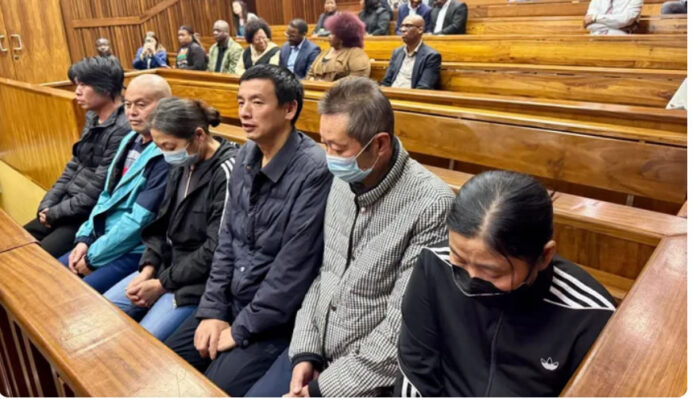Seven Chinese nationals have each been handed 20-year prison sentences by the South Gauteng High Court following one of South Africa’s most shocking labour exploitation cases.
The convicted group – four men and three women – were named as Kevin Tsao Shu-Uei, Chen Hui, Qin Li, Jiaqing Zhou, Ma Biao, Dai Junying, and Zhang Zhilian. They faced a staggering 160 charges, including human trafficking, child labour, and multiple violations of South Africa’s labour laws.
They were found guilty on 25 February 2025, and sentenced on Wednesday, bringing to a close a case that exposed harrowing details of smuggling and modern slavery at the heart of Johannesburg’s garment trade.
The 2019 Raid That Exposed Exploitation
The case dates back to November 2019, when a joint operation by the SAPS, the Hawks, the Department of Employment and Labour, and the Department of Home Affairs raided the unregistered business after a tip-off.
The company, operating under the name Beautiful City Pty Ltd, was based in Village Deep, Johannesburg. Investigators discovered that the factory was not legally registered and had flouted virtually every labour regulation – from failing to keep financial records, to providing unsafe working conditions.
Most shocking of all, the business premises were locked from the outside, trapping over 100 illegal immigrants, including children, inside.
Children Among the Victims
Authorities uncovered 91 Malawian nationals hidden in the factory during the raid. Of these, 37 were children, some barely teenagers, who were forced to work in appalling conditions.
The court later heard how many of the Malawian workers had been smuggled into South Africa inside shipping containers, a grim reminder of the desperate lengths to which traffickers go in order to exploit vulnerable people.
A Catalogue of Violations
The trial revealed a systematic pattern of abuse. Workers were denied freedom of movement, subjected to forced labour, and stripped of basic human rights. The group also contravened labour regulations by:
-
Operating an unregistered business.
-
Failing to keep proper financial records.
-
Ignoring workplace safety requirements.
-
Exploiting children and undocumented migrants.
These violations painted a grim picture of exploitation disguised as a small-scale manufacturing operation, hidden in the heart of Johannesburg’s industrial district.
Court Proceedings
The South Gauteng High Court was presented with overwhelming evidence of human trafficking and exploitation. Witness testimony, documentary records, and findings from the raid detailed how workers were recruited under false pretences, smuggled into South Africa, and then forced into near-slavery conditions.
Prosecutors emphasised that this was not a case of negligence or ignorance of the law, but rather a deliberate and sustained operation built on exploitation.
The defence offered little in mitigation, with the court ruling that the severity of the crimes warranted lengthy custodial sentences.
The Sentencing
On Wednesday, the presiding judge sentenced each of the seven Chinese nationals to 20 years’ imprisonment, underscoring the gravity of the crimes.
The ruling is seen as one of the toughest sentences handed down for human trafficking and child labour in South Africa in recent years.
Wider Implications
The conviction and sentencing highlight South Africa’s ongoing struggle with illegal immigration, human trafficking, and labour exploitation. Factories operating in hidden corners of Johannesburg and other cities often use undocumented foreign nationals, many of whom are trafficked into the country under brutal conditions.
The involvement of multiple government departments in the raid also demonstrates a growing recognition of the seriousness of human trafficking networks that span borders and exploit vulnerable communities, particularly from neighbouring countries such as Malawi.
Victims’ Plight
For the 91 Malawians rescued from the factory, the ordeal was described in court as life-altering. Children were denied education, forced into long hours of menial labour, and kept in locked conditions that posed both psychological and physical harm.
Adults, too, were subjected to exploitation, deprived of wages, and trapped in a cycle of dependence on their traffickers. The testimony of survivors painted a harrowing picture of coercion and abuse.
The Bigger Picture
Human trafficking remains one of the fastest-growing organised crimes globally, with South Africa often cited as both a destination and transit country. The Village Deep case illustrates how traffickers exploit gaps in border control and labour enforcement to sustain illicit businesses.
Officials from the Hawks and the Department of Labour stressed that the case should serve as a warning to others involved in similar activities. They reiterated that authorities will continue to pursue traffickers and employers who exploit undocumented migrants.
Moving Forward
While the seven Chinese nationals begin their 20-year sentences, the focus has shifted to the welfare of the rescued victims. Efforts are being made to provide support and reintegration assistance for the Malawian nationals, especially the children.
Authorities hope that the case will also lead to stricter monitoring of small-scale factories and a stronger crackdown on businesses that thrive on the exploitation of undocumented workers.
The conviction of Kevin Tsao Shu-Uei, Chen Hui, Qin Li, Jiaqing Zhou, Ma Biao, Dai Junying, and Zhang Zhilian marks a landmark ruling in South Africa’s fight against trafficking and labour exploitation. It sends a clear message that those who profit from human misery will face the full might of the law.

Follow Us on Twitter











